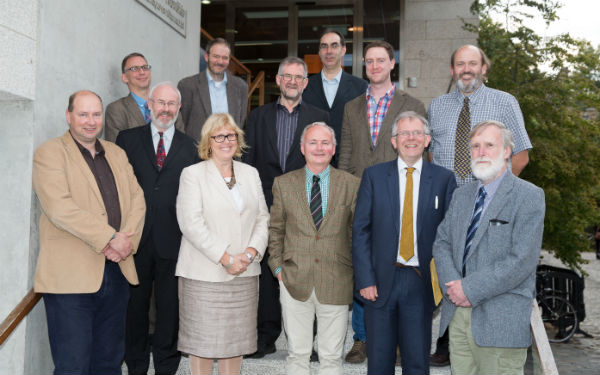Crowning of Ireland’s Last, Scottish High King Marked at Conference
Posted on: 21 September 2015
The crowning of a Scotsman as the last High King of Ireland was marked at a major international conference focusing on the 700th anniversary of the Bruce Invasion of Ireland in Trinity College Dublin on the 18th and 19th of September, 2015.
700 years ago the Irish chose a High King for the last time. The man they chose was Edward Bruce – a Scot and brother of the King of Scotland, Robert the Bruce. Edward’s inauguration as the last High King of Ireland and his three-year military campaign against the Anglo-Norman lordship of Ireland, known as the Bruce Invasion, was a seminal moment in the history of both Ireland and Scotland. It turned the tide of Anglo-Norman expansion in Ireland and galvanised the drive for Scottish independence ultimately giving rise to the two nations we recognise today as Ireland and Scotland.
This key moment in the history of Ireland and Scotland was explored at a conference entitled The Irish-Scottish World in the Middle Ages. Free and open to the public, the two-day conference was organised by Trinity’s Medieval History Research Centre at the School of Histories and Humanities in partnership with the Ulster-Scots Agency. It was the second Medieval Ireland Symposium to be held in Trinity – a series that seeks to make cutting-edge historical scholarship accessible to all people and promote a wider public understanding and enjoyment of medieval Irish history. All 13 lectures given during the two-day conference will shortly be available on Trinity’s YouTube channel.

At the conference leading national and international historians shed new light on the closely interwoven histories and shared heritage of Ireland and Scotland. The Bruce Invasion and the inauguration of Edward Bruce as High King of Ireland marked a defining moment in this relationship and had profound consequences for both Ireland and Scotland.
“This symposium is an opportunity to tell the story of how a single ‘Irish-Scottish world’ in the early Middle Ages gave way to the nations we recognise today as Ireland and Scotland. The Bruce Invasion was a watershed moment in that story,” said Seán Duffy, Professor of Medieval Irish History and one of the organisers of the conference.
“Although Edward Bruce was defeated and killed in 1318, the effect of the invasion was far-reaching. The tide of Anglo-Norman expansion in Ireland turned back and the late Middle Ages saw the flowering of a Gaelic literary and cultural revival. Scotland, meanwhile, was galvanised by its victory over the English at Bannockburn which secured its path to independent nationhood.”
“Few peoples have as much in common as the Irish and the Scots. The very name Scotland is an ever-present reminder of that connection, because, in the Latin of the early Middle Ages, a Scotus was an Irishman, and the homeland of the Scoti was Ireland. That the name came to be applied to the northern part of Britain is testament to the strength of Irish influence on what we now know today as Scotland.”
The keynote lecture was given by Professor Dauvit Broun, Professor of Scottish History at the University of Glasgow who is among the foremost Scottish historians of his generation. He addressed the topic of ‘Ireland and the beginnings of Scotland’.
Another highlight of the symposium was the session on the Bruce Invasion itself. Dr Michael Penman, University of Stirling, author of the most recent biography of Robert Bruce (Yale University Press), told the story of the invasion from a Scottish perspective, while Professor Duffy examined its impact on Ireland.
Media Coverage:
Front picture: This medieval image depicts the royal poet’s address, in Gaelic, at the inauguration of Alexander III as king of Scots in 1249, tracing the genealogy of the Scottish king back to his Irish roots, beginning: ‘Benach de re Albane Alex[andar] mac Alex[andair]’ (“God bless the King of Scots, Alexander son of Alexander”). Credit: The Master and Fellows of Corpus Christi College, Cambridge
